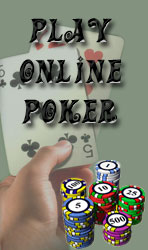Pokerwiner.com → Lessons of poker
BLUFFING
The 1978 no-limit holdem world championship at the Horseshoe in Las Vegas came down to a battle between owlish Bobby Baldwin of Tulsa, poker Oklahoma, and sartorial real-estate magnate Crandall Addington of San Antonio, Texas.
An hour before the championship ended. Addington had $275,000, and Baldwin, about half as much - $145,000.
Among the gamblers along the rail Addington was the clear favorite, but then came the hand that turned everything around. Acting first, baldwin bet before the flop, and Addington called. The flop came:



Baldwin pushed in another $30,000 worth of chips, perhaps chasing a straight or a diamond flush. Then again he might have had a pair of queens. But Addington promptly called the $30,000. Obviously he had a good poker hand himself.
On fourth street the ace of diamonds fell a scary looking card and by that time there was $92,000 in the pot.
Slowly and deliberately Baldwin pushed in one $10,000 stack of chips, then another and another, until there were nine stacks in the center of the table.
Finally, with something of a flourish, baldwin placed a short stack of $5,000 on top of the others. He was making a $95,000 bet, leaving himself almost broke.
Addington deliberated for a long time. He glanced at the stack of chips, and then at Baldwin for some clue. Was the kid bluffing? If Addington called the bet and won, baldwin would be just about tapped out.
If he called the bet and lost, baldwin would take a commanding lead. Was the kid bluffing or not? Addington decided he wasn’t an threw away his hand.
As Baldwin raked in the $92,000 pot, he made sure to flash his two hole cards in Addington’s direction. They were the:


Worthless. Baldwin had indeed been bluffing. Addington seemed to get rattled, and an hour late Baldwin won all the chips and became the 1978 poker champion of the world.
THE MYTH OF BLUFFING
Successful buffs, particularly in a high-stakes game, have great drama. Furthermore, people who do not play much poker often think that bluffing is the central element of the game.
When Stu Ungar appeared on the merv Griffin Show the day after he won the 1980 World poker championship, the first question Griffin asked him was, “Did you bluff very much?” Many occasional players who visit Las Vegas are constantly bluffing in the small $1-$13 and $1-$4 games, and they pay dearly for poker, but their foolishness.
It’s true bluffing is an important aspect of poker, but it is only one part of the game, certainly no more important than playing your legitimate hand correctly.
Though a player who never bluffs cannot expect to win as much money as someone who bluffs with the proper frequency, most average players tend to bluff too much, particularly in limit games.
When it costs an opponent only one more bet to see your hand, it is difficult to get away with a bluff, for with any kind of hand your opponent is usually getting sufficient pot odds to call your bet especially if he has seen you trying to bluff several times already.



